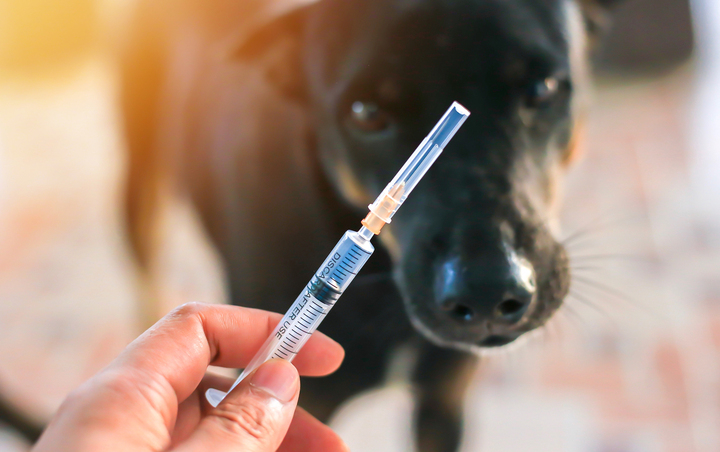What do you do when you get your senior dog’s annual vaccination reminder in the mail? Some experts say toss it in the trash, skip the shots, and schedule a wellness exam instead.
In the last few years, many pet owners have started to become more aware of the unnecessary (and expensive) vaccinations pushed by conventional vet clinics. Rather than individually treating each pet, these “vaccine dispensers” treat all dogs equally—regardless of their health or vaccination history.
The truth is most of the annual shots recommended by your vet might be completely pointless and even harmful to your senior dog. So, how can you make the best choices for your dog in a world of money-driven pet medicine and pharmaceutical propaganda? You want them to stay healthy as they age, but is annual vaccination really the answer?
Not quite.
How long does immunity last?
Immunity isn’t reset every year. Contrary to what your vet might want you to think, many vaccinations provide immunity much longer than 365 days. In fact, some might even protect your dog for their entire life. Recent large-scale studies reveal that immunity provided by some of the standard puppy vaccines lasts for many years.
According to veterinarian Jean Dodds, founder of Hemopet, the first nonprofit national blood bank program for animals located in Santa Monica, California, “We know that for [canine] distemper and parvo, for example, the immunity lasts a minimum of five years, probably seven to nine years, and for some individuals for a lifetime.”
There are risks and side effects associated with vaccines, especially in senior dogs with weakened immune systems. According to experts, vaccines should not be given more than necessary, and it’s important to evaluate immunity before revaccinating.
Ask about antibody titer tests
Vaccines aren’t inherently bad — some might even save your dog’s life! However, the problem lies in over-vaccinating, a widespread issue in modern veterinary medicine.
How can you determine if your dog really needs another vaccination or booster? The solution lies in antibody titer tests. These simple tests can ensure that your pet stays protected without blindly subjecting it to annual vaccines.
Titers measure the level of antibodies in the blood, giving a clear indication of immunity. These inexpensive and rapid result tests offer a wealth of information about your dog’s individual vaccine needs.
According to Dodds, “Any measurable titer to a specific antigen means you’ve got immune memory cells,” making a booster shot unnecessary.
Ask your vet about antibody titer tests. If they aren’t willing to perform these tests or question their efficacy, find another veterinarian. Titer tests are extremely well-researched and backed by scientific evidence.
According to one study, “It is now possible to make informed decisions regarding the need for revaccination by testing animals for the presence of antibodies. A veterinarian should always assess the relative risks and benefits to an animal in determining the need for any vaccination.”
Note: Some vaccines, like rabies, are required annually in certain states and countries. Talk with your vet to see if titer tests are acceptable in place of yearly rabies vaccination. If not, it’s essential to follow all state and local regulations.
What about the three-year rule?
The 2022 guidelines from the American Animal Hospital Association (AAHA) recommend boosters for distemper, adenovirus, and parvovirus every three years instead of annually. These updated “core vaccine” guidelines for adult dogs are a step in the right direction but miss the mark.
This type of time-based vaccination lacks individualization and could still contribute to over-vaccination, as many vaccines provide immunity for longer than three years.
Don’t skip the annual exam!
While annual vaccines aren’t usually needed for senior pets, it’s important not to skip their annual (or biannual) checkup or wellness exam. As pets age, they are at increased risk for several diseases that could be treatable if caught early.
Veterinarians will notice signs and symptoms of disease, perform routine lab work, and assess if your dog needs any non-core vaccines. They will also notice if your dog is gaining unhealthy weight (common in older pets) and will establish a diet and exercise regime to help prevent obesity.
Your dog’s health is YOUR responsibility
Veterinarians want to avoid liability, so they recommend a heavy vaccine schedule for all of their canine patients — this doesn’t mean it is right for YOUR dog. Keep records of your dog’s vaccines, lab work, and titer tests, take responsibility for their health, and find a new vet if they’re unwilling to listen to your concerns.
It’s up to you to pay attention to new developments and studies, do your research, and be willing to say “no” to unnecessary shots. Your dog deserves the best into their golden years, and annual vaccines aren’t the answer.






